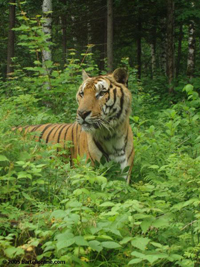Tigher killed by four other cats at Chinese animal park

After reports of deaths of captive tigers from disease, starvation and fights rooted in a lack of funding animal rights activists called Monday for tougher management of Chinese animal parks.
In the latest reported incident, a tiger at a wild animal park in northeast China was killed by four other cats in a fight over meager food supplies at the underfunded attraction, a park official said.
The more than 30 tigers in the Bing Chuan park in the city of Shenyang have been receiving less than their normal allowance of about 5 kilograms (11 pounds) of frozen chicken and beef per day, said the official, who gave only his surname, Li.
While the park relies on entrance fees for most of its income, cold weather has been keeping visitors away, Li said.
"The winter in northeast China is too cold, no one wants to come out and go to the zoo, so there are almost no visitors during the winter," Li said in a telephone interview.
Such incidents underscore a major irony in China's attempts to save its dwindling number of tigers. While less than 50 are believed to remain alive in the wild in China, about 5,000 are held captive on farms and wildlife parks that often struggle to house and feed them.
A manager at the Dongbei Hu Ling Yuan tiger park in the northeast province of Heilongjiang, home to about 800 live tigers, said poor conditions at parks were causing tiger deaths from causes both natural and unnatural. He said the park was keeping the carcasses of 200 dead tigers in freezers, but declined to say how they had died or why their bodies were being preserved. The man declined to give his name because he was not authorized to speak to reporters.
Jeff He, communications manager for the International Fund for Animal Welfare in China, said tiger raisers were using such incidents to pressure the government into lifting a 1993 ban on domestic trade in tiger parts, which are prized in traditional Chinese medicine.
Inadequate regulations on the number of animal parks and a lack of animal welfare legislation were compounding the problems and playing into the operators' hands, He said.
"I think that if these types of wild parks cannot afford so many tigers, then the best way is to actually control it so that this kind of tragedy doesn't happen," He said.
Operators already have some government support for a ban lifting.
Chinese officials earlier this year reportedly sought support for plans to farm tigers for their body parts, from India, home to the world's largest remaining wild tiger population, which opposes lifting the ban.
The Chinese officials reportedly argued that the ban has not helped in conserving the species.
The ban imposed stiff sentences on offenders and forced pharmacies to empty their shelves of tiger medications, believed to cure ailments from convulsions to skin disease and to increase sexual potency.
Activists say that permitting farmed tiger parts to be sold would spur poaching because it is cheaper to kill a wild animal than to raise a tiger on a farm and the parts are indistinguishable.
"Lifting the ban would threaten the wild tigers left in China and neighboring countries," He said.
Worldwide estimates point to about 3,000 to 5,000 wild tigers left in the world. However, conservationists believe these estimates are grossly exaggerated.
Li, from the Bing Chuan park, said the tiger was bitten to death by four other tigers Saturday afternoon. All were male and between the ages of 12 and 13.
Photographs in newspapers showed the dead tiger with its hindquarter torn open and a back leg missing. It had also been bitten in the neck, Li said.
Li said animals at the park made it through previous winters with the help of subsidies from the city government, and said park officials were negotiating with them for a solution.
The park allows visitors to drive their vehicles among tigers, bears, wolves and other animals roaming free. Entrance fees in the winter are 60 yuan per person (US$8, EUR5.50), half the 120 yuan (US$16, EUR11) charged during the summer.
Subscribe to Pravda.Ru Telegram channel, Facebook, RSS!


